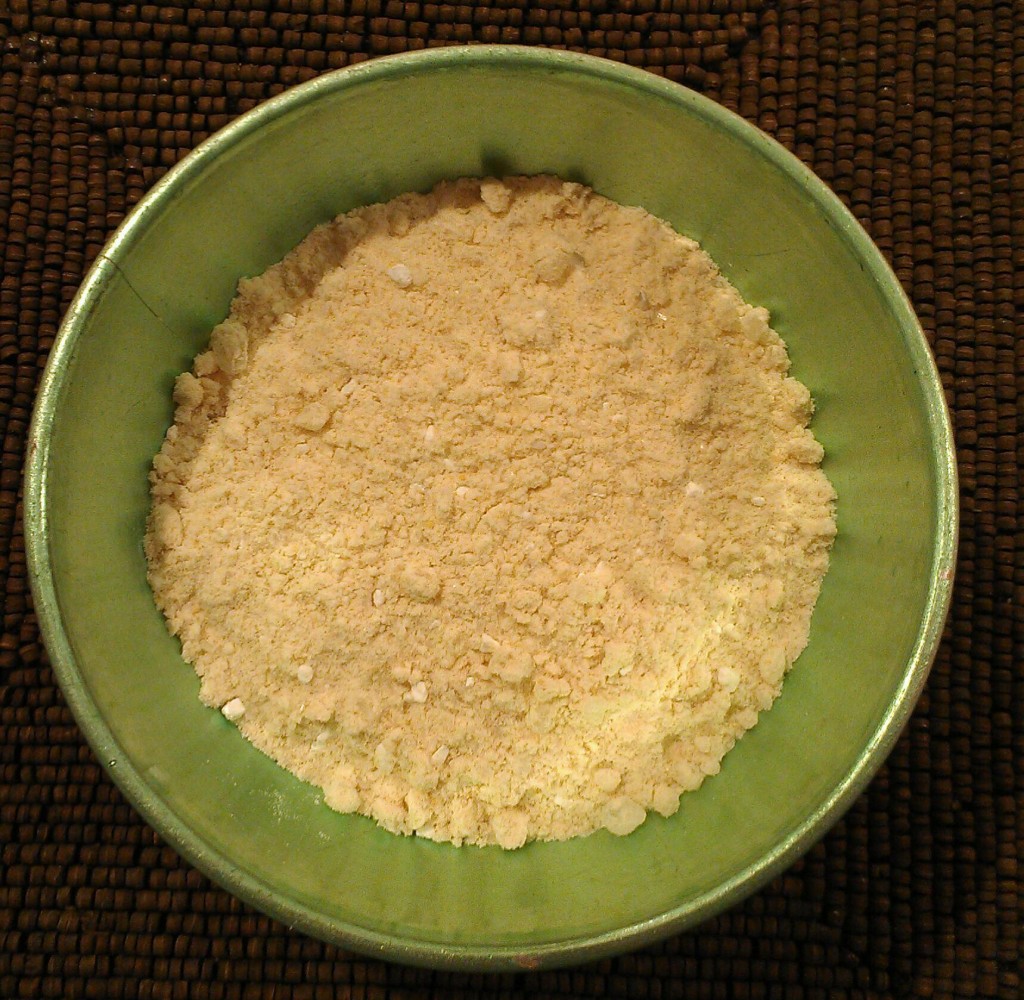
Tired? Got sore achy muscles? The chills? Make this detoxifying mustard bath scented with uplifting essential oils at the first signs of sickness and feel better in no time.
Got a bad cold — or worse — the flu coming on? Perhaps you know someone who’s sick and in need of a little TLC? If so, whip up this zesty and rejuvenating mustard bath. It’s a twist on the traditional mustard bath that’s been popular in England for decades, which stems from mustard’s use as a warming and stimulating herb to treat a variety of ailments from arthritic joint pain to muscle pain since ancient times.
My version includes the addition of muscle-soothing Epsom salt and mineral-rich Dead Sea salts. Instead of sodium carbonate, which is used in some commerical products and can be irritating to the skin and eyes if too much is used, I use baking soda, which is readily available and has the same skin-softening benefits. The addition of essential oils adds to its therapeutic benefits by relieving congestion, stimulating the immune system, and more.
This mustard bath will not only help fight off viruses, but also relieve achy muscles and uplift your mood. It’s useful any time of year, really. Athletes swear by a mustard bath’s ability to soothe sore muscles, because it helps break down lactic acid. And it’s very useful to do when detoxifying, especially when preceded by a dry skin brushing. Plus, it’s delightful if you just want to relax and relieve stress. Some even claim it relieves migraines and helps insomnia.
Ingredients
- 1/4 cup mustard seed powder
- 1/4 cup Epsom salt
- 1/4 cup Dead Sea salt
- 1/4 cup baking soda
- 9 – 12 drops of essential oil (See suggestions below)
Makes 8 oz., which is enough for one bath or 4 – 6 foot baths.
Essential Oils
The mustard bath will definitely be potent on its own, but using essential oils greatly adds to its therapeutic benefits. One of my favorite combinations to use when I think I’m getting sick is about 3 – 4 drops each of rosemary, ravensara, and Eucalyptus radiata. (See this post for an in-depth description of the last two essential oils.) It’s a very refreshing blend and always makes me feel better in no time. I also enjoy blending in some peppermint for an uplifting bath that eases mental fatigue and physical exhaustion. Other combinations work well, too, depending on the essential oils you have on hand and the therapeutic benefits you desire. Below are some of the suggested essential oils you can try and their corresponding actions.
- Eucalyptus (E. radiata or E. globulus): analgesic, antibacterial, anti-inflammatory, antirheumatic, antiseptic, antiviral, decongestant, deodorant, diuretic, expectorant, febrifuge, rubefacient
- Peppermint (Mentha piperita): analgesic, antiseptic, antispasmodic, decongestant, emmenagogue, expectorant, febrifuge, nervine, stimulant, sudorific, vasoconstrictor, vermifuge
- Ravensara (Ravensara aromatica): antiseptic, antimicrobial, antiviral, expectorant, immunosimulant
- Rosemary (Rosmarinus officinalis): analgesic, antidepressant, diuretic, emmenagogue, nervine, rubefacient, stimulant, sudorific, tonic
- Spike lavender (Lavandula latifolia): analgesic, antidepressant, antiseptic, decongestant, emmenagogue, rubefacient
- Sweet thyme (Thymus vulgaris linalol): antirheumatic, antiseptic, antispasmodic bactericide, diuretic, emmenagogue, expectorant, stimulant, tonic (Note: sweet time is much gentler than regular time, so be sure to select the correct one.)
Directions
Blend all ingredients together and store in a tightly sealed glass or PET jar if not using the mixture right away. (Essential oils break down plastic, so storing it in a regular plastic container is not advised.)
To use, add the entire mixture to a hot bath and soak for at least 30 minutes. Or, add about 1/6 to 1/4 the mixture (i.e., 2 tbsp. + 2 tsp. to 4 tbsp.) to a foot bath to revive tired feet. Then rinse off with warm water, towel dry, and bundle up to stay warm and further the therapeutic actions of the mustard bath. Meanwhile, drink plenty of water. Lemon water is especially detoxifying and great for when you are fighting a virus. It’s also refreshing. For details, see my post “Zest Up Your Wellness Routine with Lemon Water.”
How It Works
- Mustard seed’s warming and diaphoretic qualities raise you body temperature and make you sweat. This helps kill germs, stimulate white blood cell production, and eliminate toxins through the skin.
- Baking soda works as a deodorizer and softens hard water by adjusting the pH.
- Epsom salt’s high magnesium content relieves sore, achy muscles.
- Dead Sea salts are full of vital minerals with many therapeutic benefits. See this post for more info.
- Bathing helps increase blood circulation and cell oxygenation.
- Essential oils have several therapeutic actions and affect not only the body, but the mind and soul as well.
Caution! If you have any illnesses, diseases, or are pregnant, consult with your physician before using this herbal bath treatment or essential oils. Some essential oils are contraindicated in certain cases. For example, you should not use eucalyptus essential oil if you are pregnant or have high blood pressure or epilepsy. For more safety information on essential oils, read this article by the National Association for Holistic Aromatherapy (NAHA).
Other DIY Spa Baths You May Be Interested In:
- Decadent Rose Milk Bath
- Remineralizing Spa Bath with Dead Sea Salt
- DIY Warming Winter Ginger Bath
- Revitalizing Himalayan Pink Salt Rose Bath
Other Articles Related to Cold & Flu Season You May Enjoy:
- Winter Care Eucalyptus Steam to Support Healthy Breathing
- Warm Your Spirit and Boost Your Immunity with Ginger Tea
- 5 Amazing At-Home Spa Treatments to Boost Your Immunity & Be Healthier
- Top Green Cleaning Products to Stock Up On For Cold & Flu Season
- 5 Green Cleaning Tips to Stay Healthy During Cold & Flu Season
Copyright © Karen Peltier and Well Gal, 2014 – 2015. All rights reserved.
Photo © Karen Peltier and Well Gal, 2014 – 2015.

Baking soda = sodium bicarbonate, ever slightly stronger than sodium carbonate (which does not in fact have negative effects in the quantities it would normally be used in). Also the “extra” mineral content in sea salts is so minute that it would not have any effect, especially not in a hot water bath. I find this DIY to be poorly researched.
Its really a good idea never heard about this, Thank you for this creative post.
Hello Karen. Would you happen to know if substituting dead sea salt with organic sea salt would have a similar effect? Thank you in advance for your prompt response.
Hello Karen. Could you please tell me if the “dead sea salt” may be substituted? I was considering your recipie, but only have organic sea salt. Thank you in advance for your response.
Hi Bee,
Dead sea salt most likely has many more minerals than the organic sea salt you have, but it definitely wouldn’t hurt to try it.
Let me know how it works out.
Regards,
Karen
My goodness!
I was following the directions and then thought, how in the world do I understand how often to take this type of bath? There will always be this question with me and others. I love to try natural remedies and would love to be instructed on proper usage and length of time.
We all age, with out time stopping. This is just the way it is. So, to understand how to make this journey pleasant and last longer. We have to get back to the basics of what is given, for our use.
You make it easy, with this locations. Now, if only I can ask, about how many times per week. That one, would have to soak? I am a shower guy myself. So, this is useful with the length added.
Thank you once again. Helping through something that is going on now. I appreciate your knowledge and willingness to help.
Hello William.
Thanks for writing in and asking how often a mustard bath should be taken. I would say that depends on the reason you’re taking the bath and your current state of health. But in general, many alternative practitioners recommend taking a hot bath no more than two to three times per week so that it does not throw you out of balance, which is a good rule of thumb to follow. And if you are currently dealing with any medical conditions, please consult a qualified health practitioner or your doctor for advice.
If all is clear on the health front, here are some general guidelines for how often to take a mustard bath:
-If you feel like your immune system is a little down and you might be fighting a cold or flu, you could perhaps take a bath once a day for a day or two or three tops until you feel better and your fatigue has been lifted.
-For aching feet, you could take a mustard foot bath daily as needed.
-For sore muscles after an intense workout, a mustard bath is a great idea and most likely one will do the trick.
-When on a detox/purification diet, you might take a mustard bath daily (if it’s a short weekend detox, for example) or every few days depending on how long your diet lasts.
-For stress relief, one bath might be all that you need.
Finally, listening to your body is essential as well. A mustard bath is a powerful detox, so if you start to feel drained or have any kind of skin reactions from taking them, then stop or cut back on the frequency.
I hope this helps answer your question. Once again, thanks for stopping by!
Karen